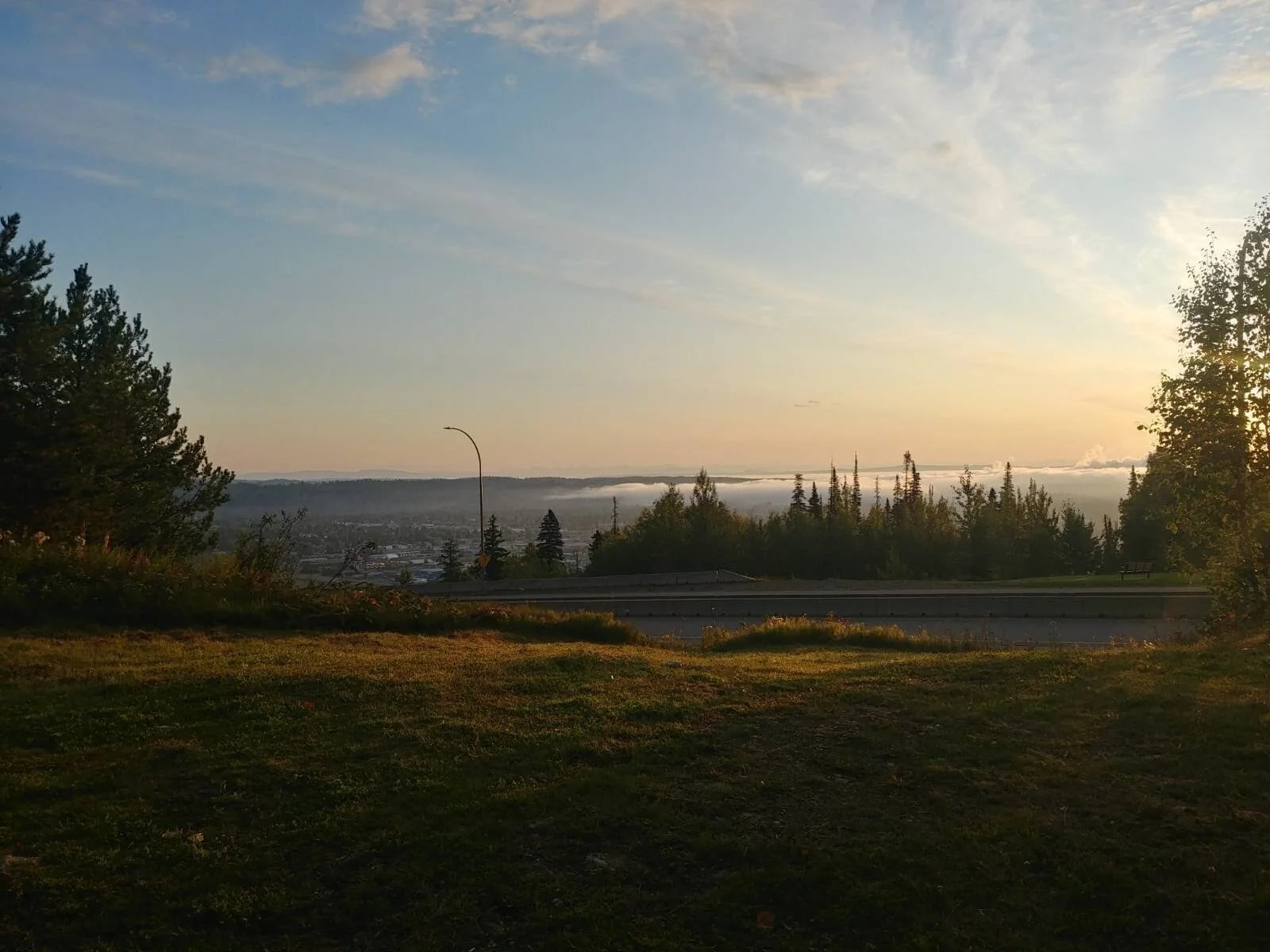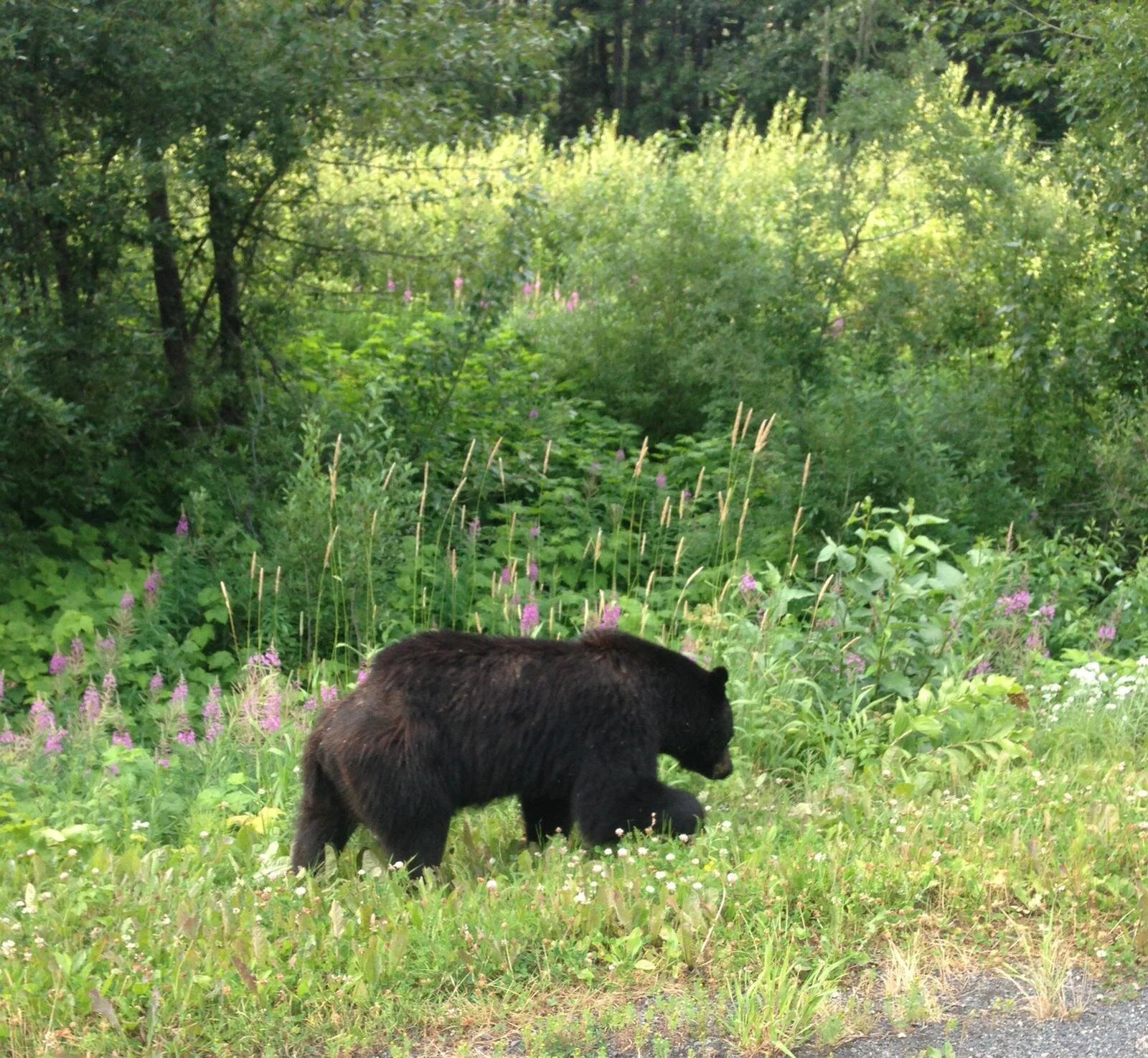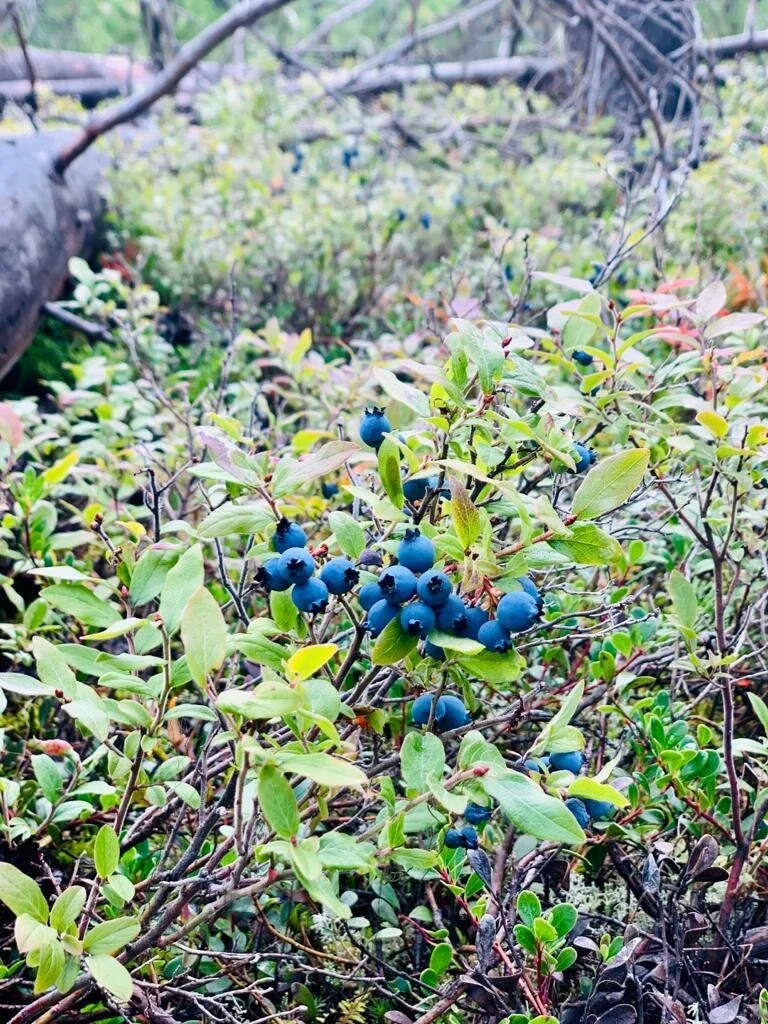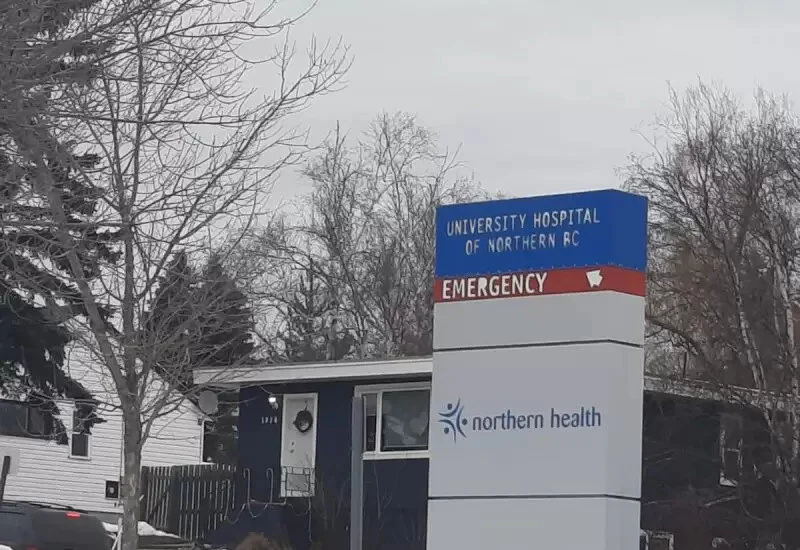On March 30, members of the PG community stood alongside the UNBC Women’s Centre in a reproductive rights rally outside of the University Hospital of Northern BC. The rally was organized by UNBC Women’s Centre coordinator, Sarah Boyd.
Are the new development proposals in Prince George actually green? A look into Arbios Biotech and West Coast Olefins Ltd
Arbios Biotech and West Coast Olefins Ltd are two corporations that are hoping to build sustainable industrial plants in the Prince George area in the coming future. Due to surrounding mountainous topography, the majority of the city lies within a bowl-like valley formation, where fine particulate matter can accumulate and get trapped.
Photo by E. Strauch.
Social wildlife management marred by misinformation, lack of resources
The decision to hunt is becoming an increasingly controversial topic on social media, with concern over trophy hunting causing many to reject the notion of hunting overall. This is having an impact on the social license, or tolerance of the practice, granted to hunters in British Columbia.
A wild black bear seen in Stewart, BC. Photo by M. Carr.
“It requires vision, to be visionary”: UNBC professor encourages social responsibility in students
Students in Prince George and Northern Uganda continue to benefit from the experience, knowledge, and positive example set by UNBC professor Dr. Christopher Opio. Having presented to many students over the years, Opio says that in his experience, young people are motivated changemakers. “Young people have a lot of ideas. They want to contribute to society in any way that they can.”
Photo courtesy of C. Opio.
Community Arts Council set to make digital media more accessible to Prince George
Local food hub bringing consumers and producers together in BC’s north
Syrian refugees experience challenges six years after arrival
Farmer living in Site C flood zone reports a grim situation
Farmer and president of the Peace Valley Landowners’ Association (PVLA) Ken Boon has been at odds with BC Hydro for over a decade. Ever since the Site C megadam project was announced in 2010, Ken Boon and his wife Arlene have been active in opposing the project. Image of the Peace River near the Alberta border. Photo by Eriel Strauch.
Quick timeline, lack of information on biofuel plant raising concerns
On March 8, city council heard a joint presentation by Sustane Technologies and Canfor representatives regarding two proposed biomass/biofuel projects they hope to be up and running by the end of 2022. The plant is being proposed to sit on the site of Canfor’s Intercontinental Mill, at the confluence of the Fraser and Nechako Rivers, approximately 2 km from Cottonwood Nature Park and within 5 km of Prince George’s downtown area.
Image courtesy of Google Maps.
Outdoor yoga for underhoused community scheduled for summer
19 year old entrepreneur brings unique cake business to Prince George
Overdose crisis impacting women differently, creating additional vulnerabilities
Local student embraces Punajbi culture through singing passion
Too close to home – Residents organize against proposed plastics plant
Alberta-based company West Coast Olefins is once again proposing to make Prince George the home for the construction of a 5.6 billion dollar petrochemical plant. Last May, CEO Ken James determined that the majority of the Prince George residents were not in favour of the plant and agreed to move the proposed site elsewhere. However, on December 15th, James publicly revoked this decision after failing to secure the support of the Indigenous communities impacted.
A view of the pulp mill from L.C Gunn park in Prince George. Photo by Eriel Strauch
Tl’Azt’En Nation doctor talks racism towards Indigenous peoples in healthcare
With the recent release of the "In Plain Sight" report by the B.C government, the public is now more aware than ever of the deeply rooted, Indigenous-specific racism within the healthcare system. Dr. Terri Aldred, who is Carrier from the Tl’Azt’En Nation, touches on her own personal experiences and insights into the topic at hand.
Photo by E. Strauch.
Review: More thoughts of TEDxUNBC
by Shae-Lynn Loughran Volunteer Journalist ***Opinion***
Image for TEDxUNBC Facebook
Shobha Sharma
In Shabha Sharma’s talk titled, “I Wanna Change The World but The World Changed Me,” she talks about the imbalance of privilege throughout the world, focusing on women's and children's right in India and Canada. Her talk started with photographs matched with compelling stories of her time spent in India and the things she experienced while there. Listening to her talk brought up some important thoughts and ideas that I now realize should be addressed daily. Sharma made it known that there is a clear difference in the two countries. In Canada, mothers are provided with plenty of medical resources while they are pregnant, yet in India, there is far little care from the government for those who cannot afford it or are not of a high enough Kast. At the end of her speech, she asks us to think about these issues, not just within our own country or India, but across the world to come to terms with our privilege. The only critique that can be said of her talk is that when she talked about India, she did not always explain some of the terms that we are unfamiliar with here. In the end, her speech was well laid out, with a natural flow, high points, emotional stories and profound questions for the audience.
Image from TEDxUNBC facebook
Pastor Seth Shelly
In Pastor Seth Shelly’s speech “Men need to talk about their sexual abuse,” he centers around the idea of narratives being placed on people, and how they affect us. He starts with a quote from his grandfather, “Are you a man or a mouse?’’ this quote proves the main point of his speech. That person is given these expectations, or narratives from an early age, often without another option that they can see. He says that “misconceptions rob identity” and that we can not label “a single identity to a group of diverse people.” He starts his speech with the first quote and continues by sharing his story. His story is very significant because we often do not hear stories of abuse from men, which only reinforces his point. However, through telling his story, he can show us the importance of not only realizing that we as a society put these narratives on youth but how speaking out about your individual story. Pastor Seth Shelly talks about how when we hear stories that are similar it helps us not feel so alone, and then give us the confidence to tell our own stories, and by doing this, we will lessen the narratives that are forced onto us. He says our stories matter and it is important that we share, as this will make us better listeners. His endnotes are that “sexual violence against males is real,” and “Your story matters.” His speech was very well laid out, he delivered it well, it was easy to see the point he made, and he helped open the audience up to a new way of thinking.
Summer fires lead to ranchers rebuilding
Photo credits - pixabay
By Iliana Kranz - CFUR Journalist ***News***
In the summer of 2017, the Elephant Hill wildfire overwhelmed the Canadian province of British Columbia. The fire left 8,944 square kilo meters of burnt land in its wake, destroying homes, barns, and fences. Among the many that were affected by this devastating, record-breaking fire, were ranchers and the ranching community. As people were evacuated and asked to leave behind cattle and other livestock ranchers were faced with some hard decisions. Some chose to stay behind and fight the fires and defend their property. Other ranchers evacuated to safer communities.
However, this did leave some cattle scattered across the range. The jury on the final count of how many cows perished is still out. Kevin Boon, who is the General Manager of the B.C. Cattlemen’s Association says we likely won’t have a reliable number until winter comes. Many cattle bodies have been burnt beyond recognition. It will be hard to track down cows that have wandered off due to the fires pushing them farther away from home.
photo credits - pixabay
The breeding season for cattle usually begins in June, however, in early July when the wildfire started the stress to the cattle likely resulted in fewer cows being "wetted" than expected. Boon says pregnancy checks will be covered for any cows that ranchers are uncertain about, as well as 70% of vet costs, for ranchers who have injured cattle. Other news sources have reported, that some cattle have been found with burns so severe that euthanasia is required as it is the only humane response. Boon says the association has had their application to AgriRecovery approved, and an estimated $20 million will be used to help ranchers rebuild. More is going to be needed to lift the spirits of these ranchers, however, and it will be no surprise to see mental health issues arise from this traumatic fire.
Radio story
Although the burning down of corrals, fences and other infrastructures is devastating, it does provide both the ranchers and the surrounding communities a chance to rebuild in more efficient ways. The government is providing support in the means of 4,200 dollars per kilometer of fence on private land, which Boon says will be very helpful to those who have to rebuild fences.
A big concern from the fires was the burning of hay and feed storage. However, Boon mentions hay and feed required for the cattle which survived are in full supply, and that fellow ranchers have banned together to support one another. This tragedy has brought out a real sense of community for many of these ranchers affected by the fires. It is still unknown the true extent of the damage created by these fires. However, it is clear that the government, community and private sector are stepping up to the plate.
Listen to the full Interview
***CFUR Volunteer Content - created by Iliana Kranz***
***Interview conducted by CFUR News Director - Grant Bachand***
Northern Marketing Plan Launched to Promote Northern BC
By Grant Bachand, Newsroom Director
The University of Northern British Columbia, College of New Caledonia, Northern Lights College, and Northwest Community College announced today along with the Ministry of Advanced Education, Skills and Training that they would be launching a new marketing strategy to promote Northern BC. A news website, studynorthbc.com is the manifestation of that partnership. The idea is to bring potential students from all over the world to Northern BC to study. The campaign will target Vancouver and other lower mainland communities, other provinces, and international students from around the world.
The idea for this program was born in one of the quarterly meetings of the heads of the four Northern post-secondary institutions last fall. The Ministry of Advanced Education, Skills, and Training came on board with an investment around $350,000 to make a total budget of just under $500,000. According to the Minister some of the institutions in the north have been seeing stagnant or declining enrollment numbers, and this program is designed to address that problem. The program will run until the end of December, and the Ministery will be reviewing the success of the program as it goes along, and may be increased if there is a demand.
"These are investments, so people aren't going to come to things they do not know." Melanie Mark Minister of Advanced Education, Skills and Training. "They are not going to travel up North to see what the North looks like; we need to bring these tools to them." When asked what her definition of success would look like the Minister stated: "Some of the Institutions are at 47% so if it goes to 48% that is a success." The aim is to simply go up not down in enrollment numbers for these northern institutions.
Review: TEDxUNBC Dahne Harding and Leona Prince
by Kayla Buttress, CFUR Contributor ***Opinion***
Dahne Harding - TEDxUNBC Speaker- Photo credits - TEDxUNBC Facebook page
Dahne Harding was the first presenter at this past weekends TEDxUNBC event. As an active social justice advocate, she spoke about how the spaces we create for people in the criminal justice system can limit their potential and even lead them to re-offend. Harding spent nearly six years working as a mental health clinician in prison and during this time she learned that the closed ecosystem of a prison could be violent and not very constructive to one’s rehabilitation into society. The lack of choice within a prison can often lead to confusion and uncertainty when people are released back into the community. This uncertainty can lead to people going back to the familiar, which can land them back in the criminal justice system. The social stigmas attached to individuals who have been in the criminal justice system further alienates them from society. Harding said that you understand yourself as reflected in your environment and if people exiting the criminal justice system see themselves the way that society does, their future can look pretty bleak. Instead of alienating these individuals we need to offer them support to grow and meet them where they are, seeing their potential instead of judging them from their past. After all, we all make mistakes, and we all can change.
Leona Prince - TEDxUNBC Speaker - Photo credits - TEDxUNBC Facebook page
The second presenter of the day was Leona Prince. She spoke about cultural privilege and truth and reconciliation within the Aboriginal community. There is a spectrum of cultural acceptance. At one end there is cultural persecution, and at the other, there is a cultural privilege. Prince spoke about her childhood, she grew up in a multicultural family and felt out of place around her peers in school. During this time she experienced persecution. As Prince grew older, she began to recognize her cultural privilege for having been raised “in culture,” where she was immersed in traditional Indigenous knowledge and grew to a strong understanding of who she was. She didn't recognize her privilege until she was introduced to a woman who recognized herself as someone who lives “in the shadows of those who live in culture”. Residential schools have stripped “those in the shadows” of their culture. In Prince’s view, the act of truth and reconciliation does not have to be a grand gesture- it is about taking many small steps and slowly unpacking history. We need to recognize that cultural privilege exists and that your truth is not everyone’s truth. We need to come together as a community and connect with ourselves before we can connect with one another.
School year has not begun and already infighting in NUGSS
By Grant Bachand - Newsroom Director
***Disclaimer author has a personal and professional relationship with a subject in this article***
To those who follow student government, last year, NUGSS suffered from its fair share of infighting. One topic that was particularly heated was the idea of instituting an oversight board for NUGSS. The motion divided the board and created frictions between the directors. This year a new conflict has begun, that has to lead to one director being censured.
Censure is a governance term which means the board does not like the behaviors of that individual.
At the August 24th, regular NUGSS meeting President Erik Searle tabled a motion which was aimed to have the NUGSS Board of Directors censure Director of Internal Affairs, Seth Jex. The motion was brought forward after the two disagreed as to the role of the Director of Internal Affairs. The censure of Director Jex was due to him publishing a document before the board had time to approve it, and his removal of another an admin from a NUGSS Facebook group.
CFUR reached out to NUGSS for comment and received the following:
“We the NUGSS Board of directors herby censure Director Jex for his actions regarding the clubs package. His removal of all other administrators from the NUGSS S.L.O. Facebook Group, the posting of clubs package before I could be voted on by the Board and his failure to follow proper measures for time sensitive, online votes are things we consider inappropriate. We as the board recognize the Directors frustrations with the speed of the procedures for Board decisions, but we believe his methods in this circumstance to be inappropriate. ”
CFUR also reached out directly to Director Seth Jex for Comment and he provided the following:
“Dear Students:
While it is clear that I did not violate policy, broke no bylaws and that my actions were in accordance with precedent from previous years, the NUGSS board still decided to censure me for my action in releasing the SLO package. The censure focused around my release of the SLO package to the student body before the board had “approved” it. While this document does not need board approval, nor had it been approved in years past I still gave my fellow board members weeks in advance to send me edits and comments. After three meetings discussing the SLO package and its edits, I felt confident to present it in final form at the August 17th meeting of the board. However this meeting was canceled due to lack of quorum from other members who could not attend. Due to the readily approaching school semester I felt that it was important to send out the SLO package to students instead of waiting another week. My role as outlined in policy is to create and process all SLO applications, allowing me to provide a competent and thorough recommendation on their approval to the board. The decision to release the SLO package is well within my ability as Director of Internal Affairs and does not violate any policy or precedent. This censure changes nothing in terms of my role or abilities as Director of Internal Affairs which only emphasises its ineffectiveness. For meaningful change edits to policy must be made, as ultimately it’s the policy that guides my actions.
I do not want this distraction to pull attention away from the real issues that the society is facing. So far, this year we have made some immense positive change for the society in regards to SLO policy, our budget and liability management and even work on board reform for our upcoming AGM. These are the achievements that make me eager to come to work and excited to work with my fellow board members. I encourage everyone remember the important parts of our mandates as student government and focus on those.
I was elected into this position and owe my job, to my constituents, the students of UNBC, who entrusted me to work for them. I will continue to work within my role as outlined in policy and bylaws to the best of my abilities to serve the students of UNBC. This year is going to be critical for our society’s future and I am committed to working together to seeing out collective goals accomplished.
Thank you,
Seth Jex
Director of Internal Affairs
Northern Undergraduate Student Society”
NUGSS has an important year and ahead of it, and they have some critical issues to contend with: a significant debt load which students are becoming more and more impatient with; Thirsty Moose and Degrees still losing money, and concerns within the student body as the effectiveness and size of the NUGSS Board. The infighting that has already begun could potentially become a major problem for the society moving forward.






















